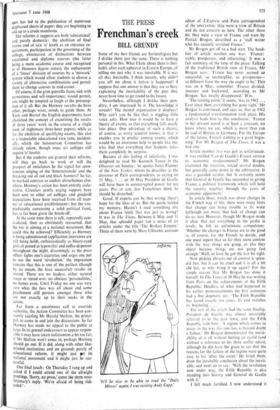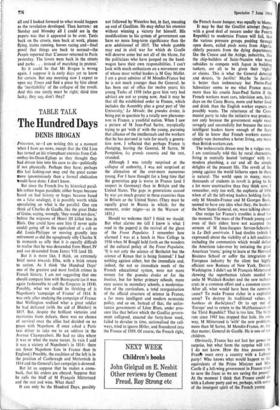Frenchman's creek
THE PRESS BILL GRUNDY
Some of my best friends are Sovietologists but I dislike them just the same. There is nothing personal in this. What I hate about them is their habit, after each upheaval in Eastern Europe, of telling me just why it was inevitable. If it was all that inevitable, I think meanly, why didn't you tell me about it before it happened? I suppose that one answer is that they are so busy explaining the inevitability of the past they never have time to get round to the future.
Nevertheless, although I dislike their pun- ditry, I am impressed by it. The knowledge it reveals! The mental organisation it displays! Why can't you be like that, a niggling little voice asks. How nice it would be to have a theory of events, so that everything falls neatly into place. One advantage of such a theory, of course, as every scientist knows, is that it enables you to predict coming events, which would be an enormous help to people like me, who find that everything that happens takes them completely by surprise.
Because of this feeling of inferiority, t was delighted to read Mr Kenneth Tynan in the Observer on Sunday : he quotes Janet Flanner of the New Yorker, whom he describes as the doyenne of Paris correspondents, as saying on 11 May, . . on 30 May President de Gaulle will have been in uninterrupted power for ten years. Pro or con, few Frenchmen think he should be disturbed.'
Good. If experts can be that wrong, there's hope for the likes of us. But the quote tickled my memory. Haven't I read something else about France lately that was just as wrong? It was in The Times. Between 6 May and II May, that splendid paper ran a series of six articles under the title 'The Broken Entente.' Three of them were by Marc Ullmann, assistant
it'll- be nice to be able to read the •uDaily Mirror" again; I was missing Andy Capp.' editor of L'Express and Paris correspondent of the SPECTATOR; they were a view of Britain and do not concern us here. The other three do; they were a view of France and were by Patrick Brogan, described as a 'staff writer who has recently revisited France.'
Mr Brogan got off to a bad start. The head- line of article number one was: 'France: stable, prosperous, and infuriating.' It was a fair summary of the tone of the piece. Talking of the traditional British view of France, Mr Brogan says: 'France has never seemed so successful, so unsheeplike, so prosperous— so different from the way she ought to be.' This was on 6 May, remember. 'France divided, insecure and backward,' according to Mr Brogan. 'has totally disappeared.' H'm.
'The turning point,' it seems, 'was in 1962 Ever since then, everything has gone right.' Mr Brogan is convinced, and says so, that in 1962 a fundamental transformation took place. His analysis leads him to this conclusion : 'France in her present mood is at least a constant, we know where we are, which is more than can be said of Britain or Germany. For the Europe of the future. French stability is a good begin- ning.' For Mr Brogan of The Times, it was a bad one.
Article number two was just as unfortunate. - It was entitled 'Can de Gaulle's France survive its economic readjustments?' Mr Brogan
examined the situation, voiced several doubts, but generally came down in the affirtnative. It was a guarded verdict, but 'it certainly seems that General de Gaulle has succeeded in giving France a political framework which will hold the country together through the years of economic adjustment.'
In article three, which was about changes in the French way of life, there were many hints that change can bring trouble in its wake (although not many that lack of change can do so, too). However, though Mr Brogan made it clear that not everything in the jardin is lovely, he felt an unfortunate compulsion: 'Whether the changes in France are to the good is, of course, for the French to decide, and one must report that so far they seem content with the way things are going, or else they object because things are not going fast enough.' Well, at least he got the last bit right.
Now picking phrases out of context is splen- did fun, but it can be cruel and it is all a bit old hat, so why bring it up again? For the simple reason that Mr Brogan has done it himself. In The Times of 30 May he was writing from Paris on the achievements of the Fifth Republic. Heedless of what had happened to his earlier pronouncements the first sentences had a fine dogmatic air: 'The Fifth Republic has lasted exactly ten years. Its end matches its beginning. . .
The rest of the article had the same finality. President de Gaulle was almost invariably referred to in the past tense, and the Fifth Republic with him: 'A regime which comes to pieces in the way this one has, is beyond doubt a failure.' Mr Brogan demonstrated the inevit- ability of it all without batting an eyelid (and without a reference to his three earlier epics), although he did have the grace to say that the reasons for the failure of the regime were quite easy to list 'after the event.' He listed them, drew the inevitable conclusion about the inevit- able, and went on to say: 'With the revolution now under way, the Fifth Republic is also receding into history and General de Gaulle with it.' _ • , I felt much fortified. I now understood it all and I looked forward to what would happen as the revolution developed. Then horrors: on Sunday and Monday all I could see in the papers was that it appeared to be over. Taxis back on the streets, men back at work, planes flying, trains running, horses racing and—final proof that things are back to normal—the People reported that `L'amour returned to Paris yesterday. The lovers were back in the streets and parks . . . instead of marching in protest.'
So it could be that Mr Brogan is wrong again. I suppose it is early days yet to know for certain. But any morning now I expect to open my Times and find a piece by him about the 'inevitability' of the collapse of the revolt. And this one surely must be right; third time lucky, they say, don't they?







































 Previous page
Previous page